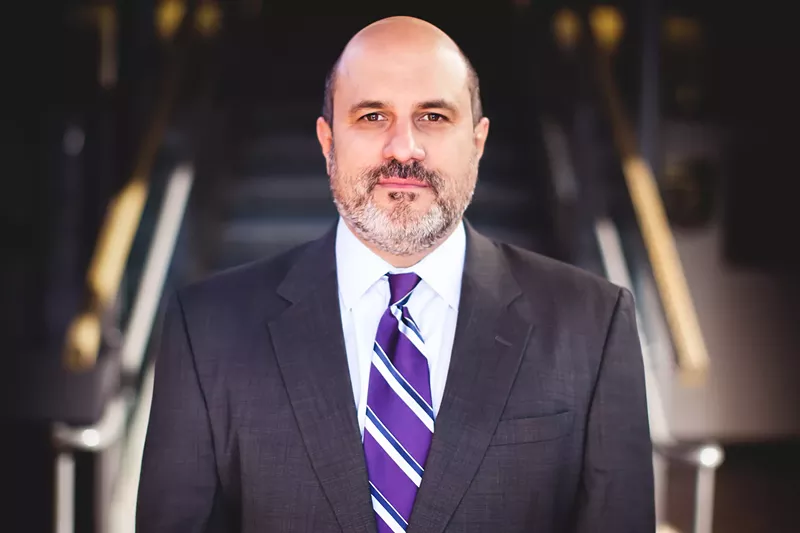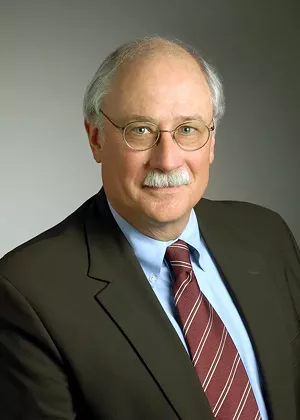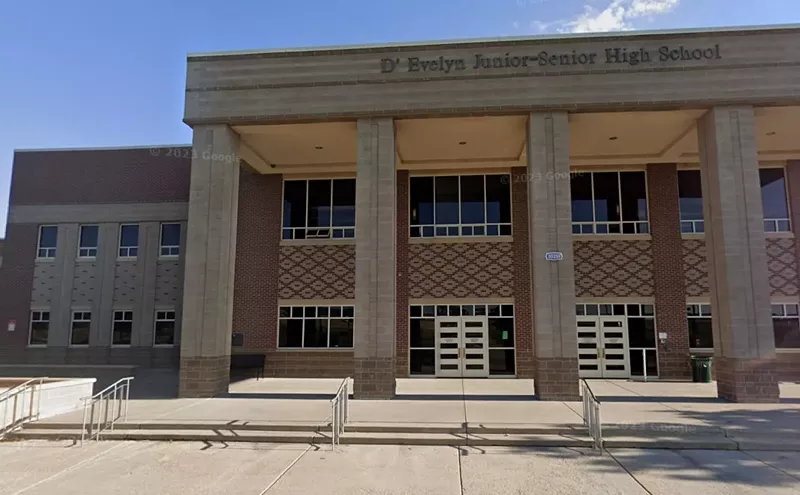The devil's in the details.
The PUC was established in 1913 to regulate electric street lights and telephones, among other utilities, replacing what had been the Railroad Commission. In the decades since, it's evolved into its current configuration. Headed by director Doug Dean, a former lawmaker, the PUC has three commissioners appointed by the governor to four-year terms: John Gavan, who was appointed in 2018 by John Hickenlooper, and Eric Blank and Megan Gilman, who were appointed in 2020 by Jared Polis.
The commissioners work full-time to oversee the rates, service, safety and infrastructure of utilities ranging from telecommunications to energy and transportation by enforcing regulations designed to ensure that they operate legally, successfully...and in the best interest of Coloradans.
Xcel is one of those utilities. Its parent company, Northern States Power, acquired Public Service Company of Colorado in 2000. That same year, NSP formed Xcel, taking it public with an initial stock offering that included Public Service Company of Colorado and other utility companies in states across the Midwest and Southwest. That’s how a Minneapolis-based company became the only option for Denver residents interested in having access to gas and electricity.
As a result, Xcel enjoys risk-free profits while regular Coloradans struggle to afford their energy bills, Caldara charges. In 2021, Xcel made $1.6 billion in profit. Public Service Company of Colorado was the company’s most profitable entity, delivering $1.22 per share to shareholders. At the same time, many consumers reported that their Xcel bills had skyrocketed.
"It's substantial," says Theresa Cullen, program manager for LEAP, which helps low-income households cover those bills. "It's staggering for people." For LEAP members, natural gas prices are up about 34 percent over last year, electricity prices up to 50 percent more and propane up 57 percent.
Caldara thinks that Coloradans can't afford to sit back and watch Xcel’s profits rise in tandem with their energy bills. But he also thinks that any company in Xcel's position, with a similar lack of regulation, would behave the same way.
“If I was Xcel, I would love this arrangement,” he says. “I would never suggest we treat captive customers with respect.”
To help captive customers break free, Caldara has come up with a citizen’s initiative that he hopes to get on Colorado's ballot this November 2022, which would require that gas and electric utility companies pay a percentage of energy rates themselves.
Caldara and his colleagues at the Independence Institute, a libertarian-leaning think tank, are no strangers to using the ballot to change policy, having successfully pushed a measure in 2020 that reduced the state’s income tax. Caldara also sponsored some highly discussed but unsuccessful measures such as Fix Our Damn Roads, an infrastructure measure, and the Colorado Healthcare Amendment, which aimed to ensure that Colorado wouldn’t be subject to federal actions like the Affordable Care Act.
According to the latest Caldara proposal, “Investor-owned utilities that supply electric or gas service or both in Colorado shall pay a percentage of all rates from their profits as determined by the Public Utilities Commission; such percentage shall be at least five percent of the total rates approved.”
If the measure makes it to the ballot and passes, Xcel would have skin in the game whenever it wanted to raise rates, taking on 5 percent of the increase itself and paying that amount back to customers out of its profits. The proposal is one way to deal with the company having a monopoly on the market.
“There are a couple of other ways to settle this,” Caldara notes. “The PUC could go back and have a least-cost guiding principle. That would be incredible. Or we could deregulate and break up the monopolies so that people can choose what power company they want.”
When Xcel Energy’s 1.4 million Colorado customers receive their energy bills each month, everything they see — from the design of the bill to the rates they pay — has been approved by the PUC. But that's small consolation when consumers are seeing such big increases in their bills.
Every two to three years, Xcel tells the PUC how much energy generation it needs to serve its customers, how it thinks its customer base will grow, and how it will need to adapt its current systems to serve those customers. The commission has to approve every aspect of that plan, including the companies that Xcel will contract with for construction and how much of those costs can be charged back to customers through energy bills.
In between those official planning periods, Xcel can ask the PUC to hear rate cases on specific items.
Recently, Xcel asked the PUC to raise rates for natural gas by $188.6 million over three years. Although the cost of natural gas has already risen, the company is seeking approval to make up those costs rather than adding the cost to bills as the price fluctuates; if the PUC agrees, the average consumer’s monthly bill would be permanently increased by over $7 a month. Currently, Xcel is also asking the PUC for the okay to raise electricity and natural gas rates temporarily this year to make up for losses from a 2021 snowstorm.
According to Rebecca Quintana, deputy director of the PUC, the Energy Section of the commission reviews requests from utility companies to be sure they meet financial, engineering, legal and economic requirements.
“The Public Utilities Commission's statutes mandate that the PUC must first give paramount consideration to the public interest,” Quintana says. “This requires constant attention to achieve the appropriate balance between the needs of Colorado customers for safe and reliable utility services at reasonable rates and the needs of utility service providers to earn a reasonable profit and to sustain a reliable utility infrastructure throughout Colorado.”
But the PUC isn't close to achieving the appropriate balance, Caldara says; he blames a 2021 bill passed by the Colorado Legislature that transformed the Office of Consumer Counsel into the Office of the Utility Consumer Advocate for making an already broken system worse.
After several earlier attempts to address concerns about rate increases for customers, the Office of Consumer Counsel (OCC) was formed in 1984 through legislation introduced by Republican lawmaker Cliff Dodge. The original counsel was Ron Binz, who served in that role from 1984 until 1995 (and won a Best of Denver award for Best Bureaucrat along the way); he later served as chair of the PUC.
Then-Governor Richard Lamm had earlier nominated Binz for a seat as a PUC commissioner, but because of Binz's work fighting the Fort St. Vrain nuclear generating station in Platteville, Public Service Company of Colorado rallied legislators to vote against his confirmation. Binz eventually lost by just one vote; lawmaker Dodge was one of those who voted against him.
That's when Dodge sponsored the bill to create the Office of Consumer Counsel. “The thinking behind it was that every special interest had lawyers before the PUC,” Binz recalls. “The steel mill in Pueblo had their own counsel every year. The mines in Leadville had their own counsel before the commission. And so the logic back then was: Where's the people's representative in all this?”
After the bill passed, Dodge recommended Binz for the job. “That was really not his style at all,” Binz recalls. “But he had the bill, and he said, after voting against me for the commission, that I ought to be the consumer advocate, and that's how it worked out.”
Duane Woodard, a Democrat who was then the state attorney general, gave Binz the nod and set up a utility consumer advisory board. The board was informal, not written into any statute, and served as a place where organizations that conducted consumer advocacy had a voice.
When Gale Norton, a Republican, became attorney general in the 1990s, she saw that the Utility Consumers Board was written into law and given the same powers as the Office of Consumer Counsel, allowing the board to determine policy rather than just acting in an advisory capacity. At the same time, the OCC and the Utility Consumer Board were transferred from the Colorado Attorney General's Office to the Department of Regulatory Agencies.
In 2021, the structure changed again when two bills passed through the legislature. Senators Chris Hansen and Stephen Fenberg and Representative Tracey Bernett sponsored the first — Measures to Modernize the Public Utilities Commission, which called for the PUC to consider disproportionately impacted communities in its rulings, to focus on helping utilities implement the state’s renewable-energy standards, and to factor in the just transition away from coal when energy companies opted to close down such facilities.
A second measure, sponsored by Fenberg, Senator Faith Winter and Representative Daneya Esgar, was the sunset bill for the OCC and renewed the office until 2028. But the bill also renamed it the Office of the Utility Consumer Advocate and made the Consumer Counsel the director of that office, appointed by the executive director of DORA. The bill also removed the Utility Consumer Board's independent powers, reorganizing it under DORA's authority. Since DORA’s executive director is appointed by the governor, Caldara says the board is no longer an outside advocate but serves at the whim of the governor’s office.
“They are no longer independent,” he adds. “They work directly for Polis’s appointees...so even your defender…is on the case to screw you.”
But Binz says the realignment simply returns the board’s legal status to match its historic role of providing advice to the Utility Consumer Advocate. “In theory, the board had more influence over the policy,” he says. “In practice, I don't think it really functioned that way. I would not suggest that it's going to make a big difference in how things go.”
Under the arrangement, the Office of the Utility Consumer Advocate and its director are still independent and not tied to electoral politics, Binz notes. In fact, Cindy Schonhaut retained her position as director, a job she's held since 2014, even if the name changed.
And Binz supports the other changes, too. When he was consumer counsel, the position's focus was almost solely on rate increases. But that focus became out of date, given the need to move toward a clean-energy portfolio and consider environmental justice.
“Those are all great ideas,” Binz says. “I fully support them, and it was not in the original mandate of the consumer advocate's office. ... I think it’s going to be a lot easier to make smart decisions at that level that simultaneously protect consumers on the financial side, but also recognize that you can't be a stick-in-the-mud on these environmental issues.”

Jon Caldara says the Comanche Generating Station is one example of Xcel's greed.
Mike Lewinski / Flickr
Adding environmental justice and energy transition to the equation cleared the way to impose higher costs on customers, Caldara adds, suggesting that as Xcel builds new, green infrastructure, it increasingly asks the PUC to let it recuperate those costs through customers' bills.
Caldara uses the Comanche Power Plant as an example. Opened in 2010, the coal plant in Pueblo cost over a billion dollars to construct and was intended to run until 2070. Customers helped pay for the original construction. Xcel's current plan calls for closing the plant early in pursuit of its goal of stopping the use of coal by 2035 as part of an $8 billion proposal that included new renewable generation projects; the PUC has postponed deliberations on that resource plan until April 26.
Caldara sees a future where customers take on that cost, incurring even higher bills when the Comanche plant could still operate for many more years. He suggests that Xcel is in cahoots with the green energy movement to charge customers more under the guise of sustainability. He says he saw the same dynamic when he was on the RTD board in the 1990s when “Birkenstock-wearing social engineers” wanted to tell people how to live and “necktie-wearing professionals” saw a chance to make money off those initiatives, including RTD's Fastracks, which Caldara opposed.
“Now we see under the guise of helping the climate...you're helping the owners of Xcel and other monopolies,” he says. “It's ugly. It's corrupt. The word is corrupt.”
That's not a word you see on an Xcel bill, where every charge is explained — but the explanation often comes in the form of an acronym that can be looked up on Xcel's billing payment glossary included on the How to Read Your Bill page on the company's website.
For the over 300,000 Xcel customers who recently switched to smart meters and time of use rates — which all Colorado customers will do by 2025 — information about how to read the new bills can be found on the Smart Meter Installation page under the How it Affects You section. People may have to click through several links to find the right information, however, and the website doesn’t have a search bar.
Caldara says that he hopes his ballot measure will not only make costs clearer, but will reduce them.
Any company making a guaranteed profit should have more accountability, he argues. He also sees this as a non-political issue that will cross party lines.
“Should I vote for it, or should I not?” he asks on behalf of consumers. “Take a look at your energy bill and tell me if that's going up as fast as your paycheck. I cannot imagine how this doesn't pass. I think there are more captive ratepayers — hostage customers — than owners of Xcel voting.”
Xcel has not taken a position on the proposal. “We’re aware of this issue and continue to monitor it,” says Michelle Aguayo, Xcel spokesperson. “There are still a lot of steps that have to take place, and therefore it is too early to comment.”
But Caldara thinks the time to comment could be soon. The language of the proposal has been finalized, and he expects a title board hearing for the measure this week. He assumes Xcel will appeal, and then there will be another title board hearing before the measure officially makes the ballot.
“We ought to remove the gold dome from the Capitol and replace it with a big Xcel Energy sign," Caldara concludes. "And underneath it say, ‘Why rent when you can buy?’ — because they own this system, they love it."













